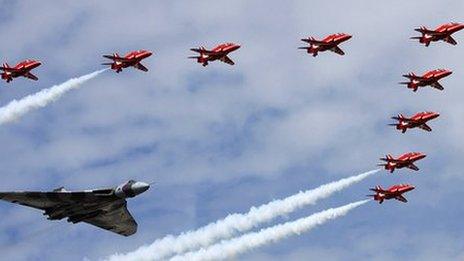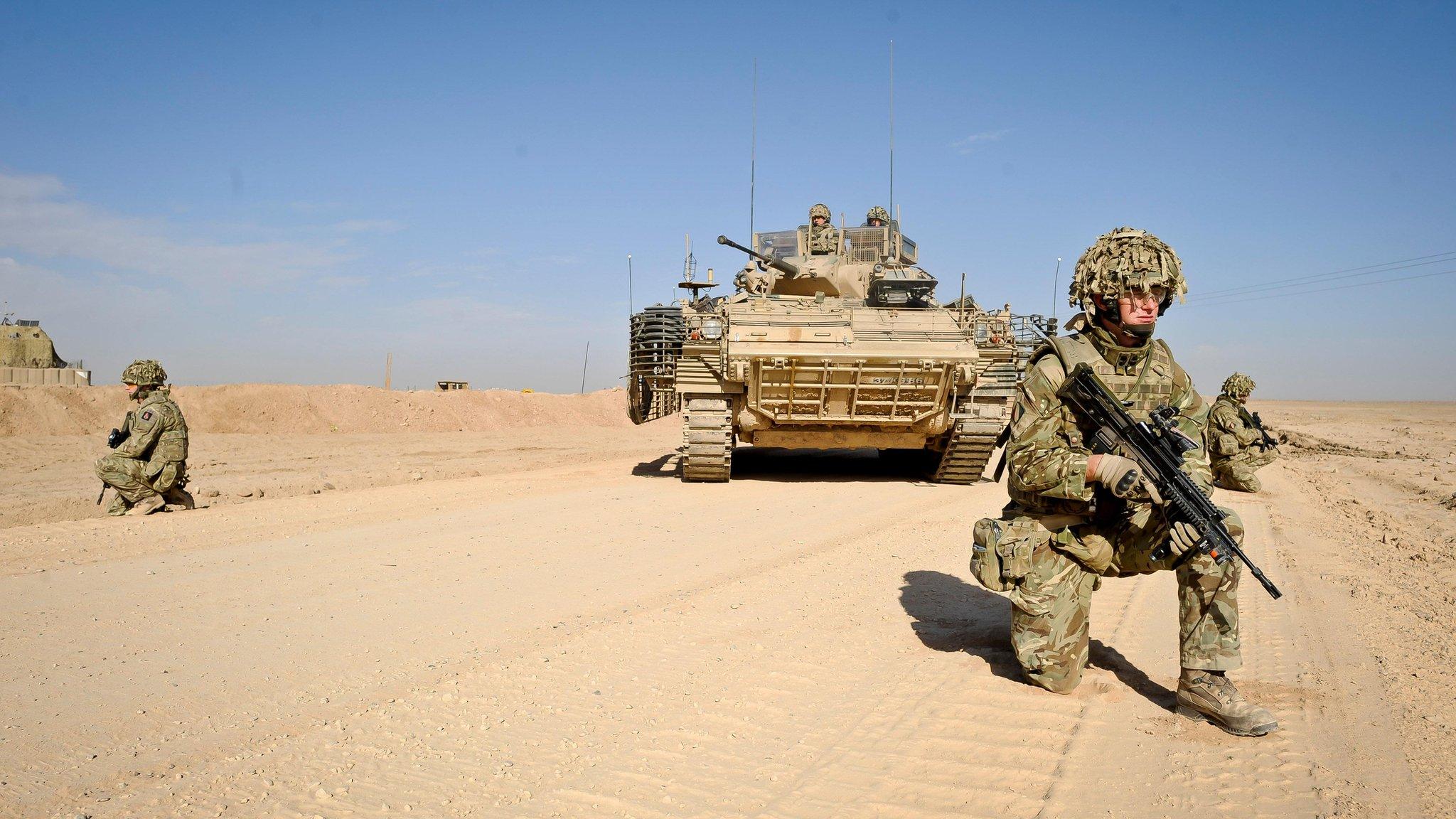PM announces £1.1bn defence spending
- Published
David Cameron: "The is a huge program of investment"
Spending of £1.1bn on defence has been announced by the prime minister.
Speaking at the Farnborough International Air Show, David Cameron outlined investments of £800m for a new surveillance package and £300m for a new ice patrol ship and radar.
This will pay for drones, UK special forces and intelligence gathering to tackle global terrorism.
Labour accused ministers of reversing mistakes made in the 2010 Strategic Defence Review.
But the government said it was plugging the "black hole" it had inherited from Labour.
Meanwhile, Russia's Deputy Prime Minister Dmitry Rogozin advised his country's delegates to "return home" after the UK's Foreign Office said no Russians had been invited to the Farnborough show as government guests because of the Ukraine conflict.
'Modern threats'
The money is not new, but has been found in a "number of ways", according to defence equipment minister Philip Dunne.
He said: "It's in part from under-spending from the department for the last two years and there is some small amount of new money taken out of the equipment plan.
"We have a 10-year equipment plan which has within it each year some contingency in the case of overspends.
"We've also got some unallocated provision within the equipment plan to pay for things that we deem to be necessary as they come up each year."
Some of the funds will help to keep the RAF's Sentinel spy-plane flying until at least 2018.
It had been due to be taken out of service early after cuts made in the defence review in 2010.
More than 12,000 service personnel have been made redundant as a result of the review.

Visitors to Farnborough will see a full-scale mock-up of the UK's latest fighter, the F-35B Lightning 2

The Royal Air Force's aerobatics team, the Red Arrows, performed at the air show on Monday
Speaking at the Farnborough International Air Show, Mr Cameron said defence planning today was "not about battle tanks in central Europe" but about "modern threats".
He said the new funding commitments were possible because the coalition government had been able to "close the black hole in the defence budget that it had inherited".
"This money will help keep our country safe and stop terrorism at source before it reaches our country," he added.
"There are threats that you cannot defend against from the White Cliffs of Dover."
The funding includes £800m of investment in an intelligence, surveillance, target acquisition and reconnaissance package.
Downing Street says it will boost special forces' ability to tackle global terrorism and hostage taking.

The prime minister in Farnborough where he announced plans for a UK Defence Solutions Centre
Different strategy
About £300m will go towards projects including a new electronic radar for the RAF's Typhoon jets, and the purchase of the Ice Patrol Ship HMS Protector.
James de Waal, senior fellow at the international security department at Chatham House, believes these announcements signal a change of strategy.
"One of the things they say they're going to spend money on is reconnaissance, and that was one of the areas that in the last security and defence review in 2010 was really neglected.
"And the last few years have really shown that was a bit of a mistake. A lot of the money they've announced today will be spent on things that are not the traditional model of the armed forces, they're not tanks, ships, aircraft.
"They're things like special forces, like the SAS, interesting information and intelligence capabilities, they're cyber."
Shadow defence secretary Vernon Coaker said the 2010 Strategic Defence Review had left capability gaps in the military.
Vernon Coaker, Coalition lacking overall strategic thinking
"The government, now, four years later, when they could have taken decisions before... are now actually trying to fill those capability gaps by using money from under-spends which were meant for other programmes.
"Of course you want to see investment in new capability, but you want to see a government that's investing according to the strategic needs and threats that it's made an assessment of, and not something that it simply makes up on the day."
Grounded fighter
Mr Cameron also detailed longer-term plans to boost the UK's defence sector, which increased exports last year by 11% to almost £10bn.

The UK has been operating Reaper drones in Afghanistan
He revealed plans for a UK Defence Solutions Centre in Farnborough to develop new defence technology.
A £4m UK Centre for Maritime Intelligent Systems based in Portsmouth is also being launched which the prime minister described as "a new chapter in Portsmouth's incredible naval story".
This operation will see the development of a hi-tech unmanned submarine.
And Mr Cameron also announced a "defence apprenticeship trailblazer" scheme intended to attract new graduates to the industry as well as develop new standards in advanced systems engineering.
Meanwhile, the F-35 combat jet, due to be used on the UK's new aircraft carriers, failed to make its UK debut on the opening day of the Farnborough show.
The entire fleet of F-35s was grounded earlier this month in the US following an engine fire.
Farnborough organisers said the aircraft is still awaiting clearance from US defence officials but is hopeful that it will fly at the airshow by the end of the week.
- Published13 July 2014

- Published14 July 2014

- Published14 July 2014

- Published12 June 2014

- Published11 June 2014
